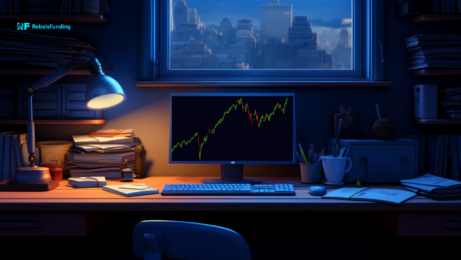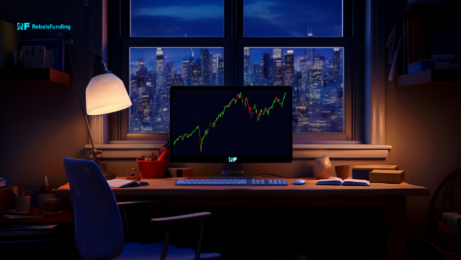How to Master your Emotions for Success in Forex Prop Trading

Our emotions have a huge influence on our prop trading performance.
The forex market requires more than just technical analysis and market knowledge (which many of us already know). It demands a deep understanding of trading psychology; our emotions, and our ability to regulate them. You see, our emotions are blind; they do not think. They can drive our funds straight into the dip (pun intended)!
As a result, you wouldn’t want to allow them to guide you or be your driver. Would you?
They can greatly impact your trading decisions, leading to impulsive actions, irrational choices, and missed opportunities in the market. And you don’t want that, right?
In the world of prop firms, where profits are the ultimate goal, conquering your emotions becomes a very crucial skill, one that separates the winners from the rest.
Let’s look at:
Common Emotional Challenges in Trading:
- Fear of Missing Out (FOMO): Fomo traders enter trades impulsively, driven by the worry of missing a potentially profitable move.
- Fear of Loss: The fear of losing money can paralyze traders or cause them to exit trades prematurely, missing out on potential gains.
- Overconfidence: A winning streak can lead to overconfidence, causing traders to take excessive risks and neglect proper risk management.
- Revenge Trading: Revenge traders trade to recover losses quickly; entering trades out of frustration can lead to further losses.
- Impatience and Overtrading: Impatience often leads to excessive trading, resulting in poor decision-making and unnecessary losses.
Understanding Emotional Responses:
The foundation for mastering emotions begins with understanding how they manifest in the trading process. Emotional responses are often rooted in our evolutionary fight-or-flight instinct, triggered by perceived threats. The amygdala, a part of the brain responsible for processing emotions, can override rational decision-making during times of stress.
How to Develop Emotional Intelligence:
To gain control over emotions, traders must develop emotional intelligence:
- Self-Awareness: Recognizing emotional triggers and understanding their impact on trading decisions is the first step toward emotional mastery.
- Self-Regulation: Learning to manage impulsive reactions by staying disciplined and sticking to a trading plan.
- Empathy: Understanding other traders’ behavior and market sentiment can help you navigate volatile situations.
- Motivation: Aligning emotions with trading goals creates a stronger connection between your actions and desired outcomes.
Practical Strategies to Regulate your Emotions:
Mastering emotions is an ongoing process that requires practical strategies:
- Pre-Trade Rituals and Mindset: Establishing pre-trade routines and a focused trading mindset can help you approach the market with clarity.
- Setting Realistic Expectations: Unrealistic profit expectations often lead to disappointment and emotional turmoil. Set achievable goals.
- Using Stop-Loss Orders Effectively: Implementing stop-loss orders ensures that losses are controlled, preventing emotional reactions.
- Journaling and Self-Reflection: Keeping a prop trading journal promotes self-awareness and helps identify emotional patterns.
- Taking Breaks and Managing Stress: Stepping away from the screen and managing stress through relaxation techniques can prevent emotional burnout or anxiety.
Visualization and Mental Rehearsal:
Visualizing successful trades and mentally rehearsing worst-case scenarios can help desensitize emotional responses, making you more resilient under pressure.
Mindfulness and Meditation Techniques:
Mindfulness techniques, such as deep breathing exercises and meditation, can help traders stay focused, reduce stress, and make more rational decisions.
Seek Professional Help:
Acknowledging the importance of mental health in trading is a significant step towards emotional mastery. In some cases, seeking professional assistance can be immensely beneficial:
- Importance of Mental Health in Trading: Mental well-being directly impacts trading performance. Ignoring mental health can lead to burnout and trading mistakes.
- Psychologists and Traders’ Performance: Many successful traders work with psychologists or therapists to address emotional challenges and develop coping strategies.
- When to Consider Professional Assistance: If emotional struggles consistently hinder your trading or overall well-being, consulting a mental health professional is a responsible choice.
Real-Life Trader Experiences:
Learning from the experiences of others can offer valuable insights into mastering emotions in proprietary forex trading:
- Success Stories of Overcoming Emotional Challenges: Hearing how fellow traders conquered emotional obstacles can inspire and provide actionable tips.
- Lessons Learned from Failures and Mistakes: Analyzing mistakes can help you avoid repeating them and develop better emotional resilience.
- How Proprietary Traders Manage Emotions: Insights from experienced proprietary traders can shed light on the effective strategies they use to manage emotions in high-pressure trading environments.
Emotional control is not about eliminating emotions, but rather about channeling them constructively. Incorporating these strategies into your prop trading routine will empower you to navigate the challenges of trading psychology, ultimately leading to improved decision-making, consistent profits, and long-term success. It would help you treat your trading as a business.
Remember, the path to emotional regulation is unique to each trader. Embrace the process, celebrate small victories, and learn from setbacks. Over time, as you become more adept at managing your emotions, you’ll find yourself better equipped to navigate the dynamic world of prop forex trading with confidence and success.



